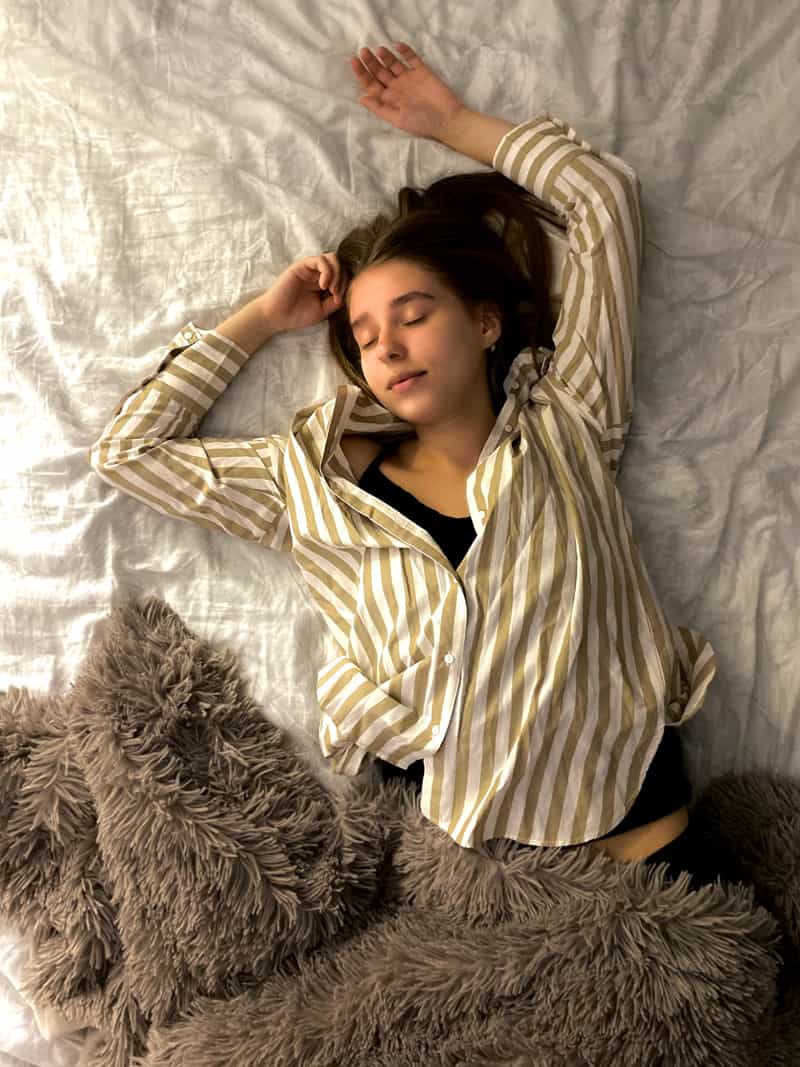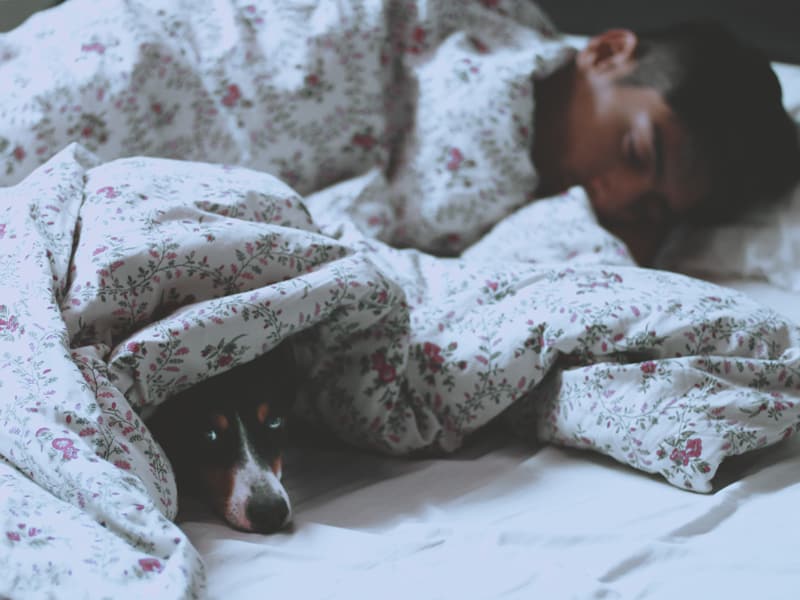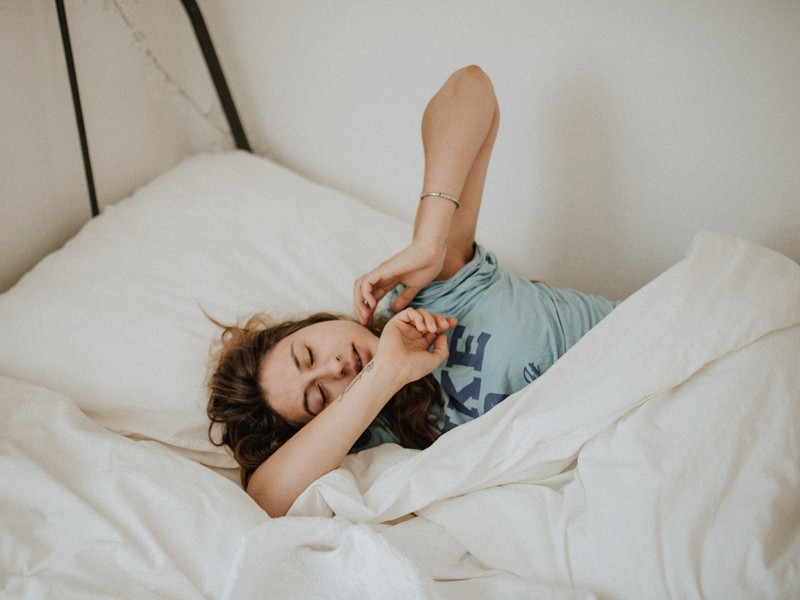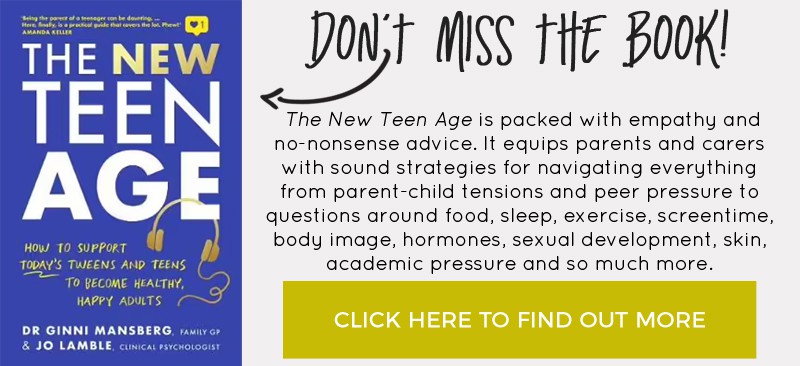In this extract from The New Teen Age, Dr Ginni Mansberg and Jo Lamble talk us through teens and sleep. Or, teens and lack of sleep.
In a nutshell, it’s basically f*#king up their brains. No wonder they are so outrageously difficult to parent some days. Take it away, Dr Mansberg and Jo Lamble…
+ + +
An extract from The New Teen Age by Dr Ginni Mansberg and Jo Lamble
Back-of-the-envelope maths tells me that the average teen will have clocked up 10–15 hours of sleep debt by the end of the school week. For some it is much worse than that. Naturally their brains try to catch up on that sleep debt by having a sleep-in on weekends.
There are several problems associated with lack of sleep:
1. Hello, Captain Grumpy
While teenagers know at one level that lack of sleep is not going to help their mood, few connect the dots and give their sleep routine the respect it deserves. The link is pretty clear. For example, in one major study of around 10,000 people (mostly adults), those with insomnia were five times more likely to develop depression than the good sleepers. Insomniacs were 20 times more likely to develop anxiety and panic.
The evidence is pretty striking for teenagers, too. A 2010 study found that teenagers, regardless of age, who regularly go to bed after midnight suffer more negative mood swings, are 20 per cent more likely to have suicidal thoughts, and are 24 per cent more likely to suffer depression and anxiety than kids who go to bed at 10pm or earlier.
2. Lower academic performance
Dr Chris Seton says the link between adequate sleep and learning and academic performance is clear. ‘We now know sleep helps learning by boosting concentration, motivation and information consolidation,’ he says.
One 2017 study found that for every 10-point increase on a certain ‘sleep regularity index’, which looked at sleep routine, there was a 0.10 increase in grade point average (GPA marker) of university performance. And it’s not just about sleep routine. The worse the quality of the sleep, the lower the GPA, according to a study from Harvard Medical School.
One theory for this lower performance in sleep-deprived people is the microsleep. Yes, these are actually real and you can see them on a brain tracing called an EEG. They last between half and 15 seconds at a time and we aren’t always aware when they happen.
Studies have shown that the worse your sleep deprivation, the more microsleeps you have. We now know that microsleeps impair the continuity of brain function and that they tend to occur prior to performance failures of various kinds.

3. Increased risk of accidents
This is an important one for teenage drivers and those with jobs involving machinery. The relationship between sleep duration and accidents is pretty telling. Studies have shown that in driving simulation tests, accidents increase progressively as total sleep duration drops.
A US study published in 2015 found that, compared to drivers who had slept for at least seven hours in the past 24 hours, drivers who reported that they had managed just 5–6 sleep hours the night before had almost double the crash rate. The less the sleep, the greater the likelihood of a crash. So, if they only slept 4–5 hours, they had 4.3 times the crash rate and for those getting by on less than four hours of sleep, they had 11.5 times the crash rate.
4. Risky behaviour on the up
In a landmark 2018 American study of over 67,000 adolescents, the findings were stark: lack of sleep leads to poor judgement. The study found that sleep duration was inversely associated with the likelihood of self-harm, risky sexual behaviour, and the use of tobacco, alcohol and other drugs. In other words, the less sleep the teens had, the more likely they were to engage in risky sexual behaviour, use drugs or drink too much.
One explanation for this comes from fascinating tests known as FDG glucose–PET studies, in which we can directly see the metabolism in specific parts of the brain. Well, guess what? If you deprive someone of sleep for 24 hours as part of a study, their metabolism is reduced in their prefrontal and parietal cortex areas, the parts of the brain most important for judgement, impulse control, attention and visual association. So, the parts of the brain most responsible for higher-order thinking and decision-making are the most affected by sleep deprivation.
5. Poor sporting performance
One study of NBA basketball players showed significant improvements when they had more and better sleep. Adequate sleep saw the sportsmen reacting more quickly, remembering their set play better, and showing greater accuracy in shooting and faster sprinting. They also increased their 3-point field goal percentage by 9.2 per cent and their free throw percentage by 9 per cent. Plus, the players reported that they felt better physically and mentally during competitions and practices when they slept more.
6. Lowered immune system
Sleep deprivation in teens has been linked to lower levels of human growth hormone, which, as well as enhancing physical growth, boosts the immune system. Plus, not getting enough sleep slashes the number of T cells (important immune cells) in a teenager’s body by 30 to 40 per cent, impairing their ability to fight everyday infections. It also adversely impacts on immune system cells being able to talk to each other through ‘cytokines’ such as interleukin.

7. Weight gain
I mention this because it might be a big motivator for some teens. Being sleep deprived alters the food choices you make.
Just one bad night’s sleep has been linked to eating more food and of poorer quality. It’s also linked to getting hungry at random times, so that you end up snacking all day, which we know just increases the total amount you eat. I know I crave junk food if I haven’t sleep well. Studies consistently show that increasing the amount of sleep for chronically sleep-derived people – to just over six hours per night – improves their glucose metabolism.
There is growing evidence that a lack of sleep stuffs up the metabolism by impacting on two very important hormones. The first is leptin, the ‘I’m full’ hormone made by your fat cells. Leptin levels are naturally elevated during sleep so that you can last a full night in bed without needing to eat. From studies in rats and mice, we know that going to bed very hungry impairs their sleep and, conversely, being sleep deprived turbocharges their appetite.
The second hormone impacted by sleep deprivation is ghrelin – the ‘I’m starving’ hormone made in the guts. This tends to get dialled down naturally during sleep. Studies in humans show us that sleep deprivation raises ghrelin levels, making your teen’s appetite surge.
Sleep deprivation also has effects on other hormones, such as thyroid-stimulating hormone (TSH), cortisol and growth hormone. These might also contribute to the effect of sleep deprivation on obesity.
8. Headaches
Not every teenager gets headaches, but studies do show us that headaches, including migraines and tension headaches, are more common in sleep-deprived people.
9. Worse acne
It seems from studies that a lack of sleep pumps up your levels of cortisol, making acne worse. While it’s hard to extricate lack of sleep from stress, which boosts your cortisol levels, it does seem that the less you sleep, the worse the zits.
+ + +
OMG, that’s such a big list. Teens and sleep deprivation are a terrible combination. We’ll feature an article shortly on how to help your teen get more sleep. The first step is encouraging them to actually care… no mean feat. The list provided by the authors above should hold the key to getting through to most teens.
Text from The New Teen Age by Dr Ginni Mansberg and Jo Lamble. Murdoch Books RRP $32.99.
Feature image by Kinga Cichewicz; striped pjs by Milan Gaziev; pup by Claudia Mañas


